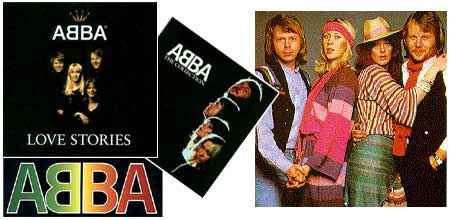Abba

Synopsis of Pop Music
“You are the Dancing Queen, young and sweet, only seventeen,
Dancing Queen, feel the beat from the tambourine,
You can dance, you can jive, having the time of your life,
See that girl, watch that scene, dig in the Dancing Queen...”
Few groups personify pop music the way Abba does. This gifted quartet of pop performers became international superstars during the late 1970’s with a string of immaculately-crafted pop singles that, even by modern standards, seem to leap out of the speakers at the listener. Songs like “Dancing Queen,” “Fernando” and “Take A Chance On Me” encompass everything thrilling about pop music: lush vocal harmonies, bouncy melodies with catchy choruses, and hooks galore all wrapped in a big, glossy sound that never fails to thrill. This magical sound made Abba one of the most successful pop groups of all time.
Although Abba gained their international fame quickly once they broke through in the mid-70's, it was a long climb to the top. All four members had a long and involved history in European pop music before they began performing together. The beginnings of Abba date back to the first meeting of Swedish songwriters Benny Andersson and Bjorn Ulvaeus. They soon became writing partners and began penning Swedish hits. During this time, they wrote songs for Agnetha Faltskog and Anni-Frid ‘Frida’ Lyngstad. Soon enough, the two twosomes became a pair of married couples and began recording singles together in 1972, starting with piano-driven “People Need Love.”
Abba earned their breakthrough in 1974 when they won the Eurovision Song Contest with “Waterloo.” This driving pop tune compared a bad relationship to Napoleon’s famous defeat and boasted a big wall-of-sound production fuelled by guitar, piano and saxophone. It became a worldwide hit and went Top-10 in the U.S. Abba followed it up in 1975 with another U.S. Top-20 hit in “S.O.S.,” an ultra-catchy tune that contrasted keyboard-led ballad verses with a powerful guitar-driven chorus. Abba also continued to build their international fanbase with classics like “Mamma Mia,” a pulsating slice of pop that highlighted a unique xylophone hook on its chorus.
In 1977, Abba scored their biggest international hit with “Dancing Queen.” This tale of a girl finding joy on the dance floor cleverly fused Abba’s frilly European pop style to an up-to-date disco beat to become a #1 smash in the U.S. It also topped the charts in several other countries, including England and Germany. Abba also hit the Top-15 that year with “Knowing Me, Knowing You,” a power ballad lamenting a love gone bad. The hits continued in 1978 with the early synth-pop of “The Name Of The Game” and “Take A Chance On Me,” the latter a danceable love song with unusual, rhythmic ‘stuttered’ harmonies. 1979 saw the group experimenting with disco once again on songs like the Top-20 hit “Does Your Mother Know?”
In 1980, Abba scored a surprisingly serious Top-10 hit with “The Winner Takes It All,” a bittersweet power-ballad about the end of a romance. The heart-tugging lyrics were a direct reflection of what was going on in the group: Both couples were in the process of splitting up. Abba continued on for a few more years as they developed a sleek, synth-pop style on albums like Super Trouper and The Visitors. They continued to score worldwide hits with danceable tunes like “Gimme Gimme Gimme (A Man After Midnight).” At the end of 1982, Abba brought an amazing decade of success to a close by splitting up.
Since then, both Agnetha Faltskog and Frida Lyngstad have enjoyed success as solo performers. Lyngstad scored a big hit in 1983 with “I Know There’s Something Going On,” a drum-driven pop tune produced by Phil Collins. Benny Andersson and Bjorn Ulvaeus have continued to work together as composers and found international success with their musical Chess, which featured a worldwide hit in “One Night In Bangkok.”
Meanwhile, Abba’s classic pop continues to weave its magical spell on pop fans everywhere and has been covered by artists as diverse as U2 and Sixpence None The Richer (including an all-Abba-cover EP from Erasure). All in all, Abba’s legacy of hits and their unerring knack for melody ensure that they will always be legends of pop music.
Artist Release History
03/23/73 - Ring Ring03/04/73 - Waterloo
05/21/75 - Abba
11/17/75 - Greatest Hits, Vol. 1
10/11/76 - Arrival
10/12/77 - The Album
05/23/79 - Voulez-Vous
10/26/79 - Greatest Hits, Vol. 2
11/03/80 - Super Trouper
11/30/81 - The Visitors
11/05/82 - The Singles: The First Ten Years
1986 - Abba Live
08/09/93 - Abba Gold
06/01/94 - More Abba Gold
04/18/95 - Thank You For The Music
Pop Sub Categories
popEssential Music Albums
Abba Gold (Polygram)Band Members
Agnetha Faltskog vocalsAnni-Frid "Frida" Lyngstad vocals
Benny Andersson vocals, keyboards
Bjorn Ulvaeus vocals, guitar
